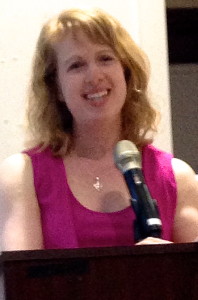
The Writers’ Room of Boston held its annual reading on June 9, featuring members and fellows reading from their works-in-progress in a variety of genres, including poetry, YA, fiction, and nonfiction.
For so many of us, writing is a solitary endeavor. Even though we may be writing in the same room, at The Writers’ Room our policy is to respect the quiet and the work being done within it. Unless we step outside the main room, we don’t have the opportunity to speak with each other. In the social space of a reading, however, we can share our work and have conversations about our poems, stories, novels, essays, and memoirs; we can ask questions and discuss the writer’s life. We can more directly connect with each other through the art of something we love.
Readings can be mutually beneficial for the writer and his or her audience. For the writer who is reading, the chance to share one’s words with others can be freeing, joyous, nerve-wracking, and invigorating. Simultaneously, an audience member can be entertained, transported, enlightened, educated, inspired, and more.
As writers, we can attend readings not only to be a part of the passionate interchange of sharing works, but to learn about effective (and ineffective) approaches to delivering a reading ourselves. Here are a few elements to think about when you attend a reading:
- Craft: Listen to the way a fiction writer unfurls the narrative arc of a story. Notice the moments or “dots” that connect the line of tension. At a reading, a writer cannot present an entire work; he or she creates a compressed version to share. How does the writer hold your attention (or not)?
- Presence: How do writers carry themselves when they read in front of an audience? Do they appear confident, hesitant, overbearing, understated or somewhere in between? Notice their style of using the microphone or standing behind a podium. Does the writer read for too long and lose your interest? Take a look around—what do you notice is the effect the writer has on other audience members? Are there any distracting habits you might have yourself that you’ll want to avoid when the time comes for your own reading (for example, some folks play with their hair or tap their feet)? Note: if you are giving a reading, you might ask a friend to videotape you so that you can learn about your own presence.
- Voice: Hearing a work read aloud is a different experience than reading the work silently to yourself. At a reading, can you understand everything the writer says? Does the writer mumble at all or speak too quickly, loudly or slowly? Is the writer’s voice animated, welcoming, soothing, or harsh? What is appealing about the writer’s voice? What is appealing about your own?
We can attend a reading for the sheer pleasure of it. At the same time, if we allow what we see and hear to soak in, a reading can not only touch us but teach us something. It might even serve as a launching pad for our improvement and growth as writers.
-Tracy Strauss, Fellow in Nonfiction

